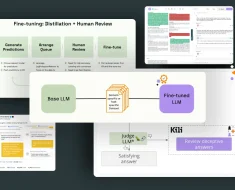
The Five Key Takeaways from This Blog Post
- Artificial general intelligence (or, A.G.I.) refers to artificial intelligence (A.I.) that can equal or do better than a human intelligence in many cognitive tasks.
- The mere possibility of A.G.I. is highly controversial among A.I. experts, as some believe it is truly impossible.
- Despite any controversy surrounding the question of A.G.I.’s possible existence, the fact of the matter is that many A.I. companies, such as the high-profile industry leader OpenAI, are looking to create artificial general intelligence.
- Whether such technology actually meets the criteria to fulfill a definition of A.G.I. widely agreed upon by A.I. experts, the fact of the matter is that this tech will serve a wide range of purposes to business owners.
- Perhaps the most key thing to realize about A.G.I. (or just pseudo-A.G.I.) is that it is able to adapt to a wide range of tasks to build a large and diverse skill set. This skillset could make for a virtual Swiss Army Knife for business owners.
The State of the A.I. Industry
There have been several incredibly big changes that we have seen in A.I. over the past two years.
Many of the big changes have come in the form of a quickly evolving generative A.I. field. There, text-generating A.I. soon became supplanted in wow-factor by things like image-generating and, we are increasingly seeing, video-generating A.I.
This generative A.I. evolution is headed toward something quite like a beefed-up creative software suite that can generate content as well as transform it to your needs.
And this gen A.I. trend represents the ambitions of some of the tech industry’s largest players as a whole, which is to create A.I. that somewhat resembles, or simply just is, artificial generative intelligence.
The Artificial Generative Intelligence Problem
So the whole issue here is that many A.I. experts find the very notion of A.G.I. to be dubious. At best, one in the A.G.I.-denial camp would posit, a tech company could create pseudio-A.G.I. (hereafter in this article to go by the acronym P.A.G.I.) that can perform a wide range of tasks, but lacks some quality deemed essential to human intelligence to not be said to truly possess “general” intelligence.
These arguments to certain tech leaders matter very little, for the vision these leaders have for A.I. is to create A.G.I., or some close-enough P.A.G.I. that the tech industry will go ahead and market as artificial general intelligence regardless.
The venerable film critic Pauline Kael noted in the 1970’s that the directors of big movies were like contemporary mad kings. Nowadays, that comparison is probably more apt for the captains of Silicon Valley industry steering their companies’ ships into bigger better faster stronger A.I., while the rest of the world kind of just needs to take the effects of this relentless pursuit as it comes.
And the aftereffects of the A.G.I. pursuit are sure to bring many highly sophisticated and effective tools to the disposal of business owners everywhere.
Business Owners Will Certainly Benefit Here
Ultimately, whatever utopian visions certain techies in the Silicon Valley bubble may link to the fruits of their daily grind, the ultimate reality is that the biggest paying consumers of A.I. will be companies that integrate this technology into their daily operations.
As such, most tech leaders understand that if the direction of A.I. development is to be commercial, then it must be in the interests of extracting profits from businesses.
And so, the A.G.I or P.A.G.I. that tech companies will offer business owners will basically be like semi-human employees that can adapt to and perform a range of tasks across various disciplines.
Think of a graphic design A.I. that can double as a price prediction platform for finding the optimal price for your weekly orders of raw materials.
Such broad capabilities and adaptability made possible through machine learning technology is what business owners will get from this emerging technology.
The really significant thing to understand about this kind of evolved A.I. is that the goals you can set for it cannot be so narrow.
Right now, the ChatGPT platform can write a whole lot of different kinds of text content, but it cannot, say, suddenly analyze a layout of your warehouse and offer you some predictions for what may be the optimal inventory management strategy.
That, then, is the promise of A.G.I. (or P.A.G.I.) for business owners: A.I. that is like a true Swiss Army Knife that can be highly skilled across a broad assortment of dissimilar tasks.



